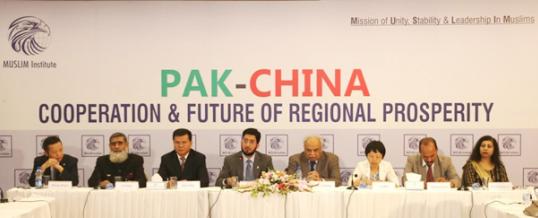
MUSLIM Institute organized a Seminar on “Pak-China Cooperation and Future of Regional Prosperity” on Thursday September 19, 2019 at Islamabad.
Amb (R) Riaz Mohammad Khan, Former Foreign Secretary of Pakistan chaired the occasion. Chairman MUSLIM Institute Sahibzada Sultan Ahmad Ali delivered the opening remarks whereas Vice President Yunnan Academy of Social Sciences, China Shen Xiang Xing gave special remarks. Amongst distinguished guests were Writer & Analyst Brig (R) Abdul Rahman Bilal, Dean Social Science Air University Dr Waseema Shahzad, Director Pakistan Research Centre, Yunnan Academy of Social Sciences, China Ms Li Min, Ambassador (R) Syed Hassan Javed, Ms. He Ruifang from Institute of South Asia Studies Yunnan Academy of Social Sciences, China and Second Secretary Chinese Embassy Prof Dr Zhang Jiegen. Research Associate MUSLIM Institute Mr. Usama Bin Ashraf moderated the proceedings. The panelists observed that time-tested Pakistan-China all-weather cooperative partnership is an anchor for peace and stability in the region and beyond. All-inclusive bilateral cooperation China and Pakistan has always been instrumental in advancing efforts regarding regional prosperity. However political instability in Afghanistan and the illicit destabilizing activities from the Indian side in Pakistan and the region, are some of the notable challenges. India has never accepted either BRI or CPEC and even categorically rejected this cooperative venture. Although India has failed to abet the comity of nations against Sino-Pak cooperation for the regional prosperity, it keeps on quoting false excuses to counter it. India neither participated in the BRI summit in 2017 nor in 2019. Indian side was expected to soften its position on the BRI after getting the full membership of SCO in June 2018. However, India was the only member country that did not endorse the BRI projects in the Qingdao Declaration. A complete paragraph about the BRI was removed from the declaration of the 9th BRICS summit in Xiamen, China in September 2017 due to Indian objections. Frustrated and flustered, following the Chanakya’s policy, India has been trying to disrupt the CPEC through anti-state activities since the inception of this project. Although it has been funding anti-state terrorist groups and insurgents in Pakistan prior to the start of this project, it has been trying to intensify the operations since 2014. The Indian RAW agent Kulbhushan Yadav who was caught in Baluchistan in March 2016 confessed that he was tasked to destabilize different parts of Pakistan especially Baluchistan, the important region for implementation of CPEC. Similarly, Ehsan Ullah Ehsan, the former spokesman of Tehreek-e-Taliban Pakistan (TTP) also revealed the destructive role of RAW in funding different insurgent and terrorist groups to work against the CPEC and Pakistan as a whole. Moreover, alarmingly Indian Nuclear Arsenals are in direct control of Fascist Hindutva rogue regime of BJP. Changing of Indian Nuclear policy from No First Use (NFU) to “No” – “First Use” in case of war is a severe threat to regional peace and stability. Speakers further observed that Schengen type arrangements are needed to enhance the capacity of regional security. Inclusion of China Arab States Forum (CASCF) and Iran in the mainstream projects of BRI and CPEC has become inevitable to mainstream regional security in accordance with changing world politics. In order to further strengthen sustainable strategic partnership, frequent exchange of views on regional and international developments in regional and global forums as well as exchange of high level visits and Experts delegations is the need of the hour. China Pakistan cooperation and CPEC are not only about trade and economics but also about cultural, educational and intellectual exchange and transformation of the region. Completion of CPEC and exploration of Pakistan’s natural resources will enhance the foreign direct investment in Pakistan and hence increasing the regional progress in the emerging Asian century.
Sep









